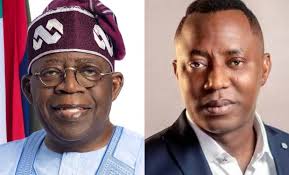
The latest attempt by the Department of State Services (DSS) to compel X Corp. to delete a tweet by Omoyele Sowore, simply because it criticised President Bola Ahmed Tinubu, is a dangerous assault on freedom of expression. It signals a disturbing slide towards authoritarianism in a country that claims to be the largest democracy in Africa.
Global rights watchdog, Amnesty International has now weighed in, condemning what it described as a brazen attempt to silence dissenting voices. According to Amnesty International, X had already notified Sowore of the DSS request, which it rightly said amounted to censorship and an effort to instil fear in Nigeria’s online civic space. The organisation stressed that the demand violates Nigeria’s obligations under the 1999 Constitution, the African Charter on Human and Peoples’ Rights, and the International Covenant on Civil and Political Rights.
All of these guarantee freedom of expression and privacy. In its words: “The DSS targeting of Sowore’s X account is being done without any legal justification, as recognised under international human rights law.” Amnesty has therefore urged the government to immediately withdraw the demand and called on X not to yield to official pressure, reminding the platform of its responsibility to safeguard activists’ voices. THE NIGERIA STANDARD unequivocally supports Amnesty’s strong position.
Moreover, the DSS demand is unconstitutional, draconian and an affront to both Nigeria’s democratic order and its international obligations. If the Tinubu administration genuinely believes Sowore has broken the law, the only legitimate path is due process in a court of law and not crude censorship by proxy.
What makes this action by the Tinubu administration even more apalling is the rank hypocrisy it exposes. Nigerians have not forgotten that in February 2011, Tinubu, then a chieftain of the Action Congress of Nigeria (ACN), dismissed then-President Goodluck Jonathan as “a drunk sailor fisherman whose boat is about to capsize.” Nor have they forgotten that in 2019, during an APC rally in Lagos, Tinubu told Nigerians to “dump former President Olusegun Obasanjo in the dustbin,” deriding him as “expired meat” and “the greatest election rigger in this country.”
Indeed, these were not mild words. They were scathing, personal attacks that went far beyond the criticisms Sowore has made. Yet, Tinubu was never threatened with prosecution, nor did the DSS demand that his words be erased from the public record.
Therefore, we declare that what is good for the goose must be good for the gander. Unfortunately, Tinubu, who once thrived on acerbic denunciations of past leaders, now appears incapable of tolerating the same treatment. No doubt, this is double standards of the highest order, unbecoming of a self-proclaimed democrat. True democracy requires tolerance for dissent, even when it is uncomfortable or unflattering. Leaders who cannot withstand criticism have no business governing in a free society in the first place.
The parallels with former President Muhammadu Buhari’s infamous Twitter ban in 2021 are too glaring to ignore. That ban, imposed after the platform deleted one of Buhari’s tweets, dragged on for seven long months. It attracted widespread condemnation at home and abroad, strained Nigeria’s diplomatic relations and cost the economy billions of naira in lost revenue. It became a permanent stain on Buhari’s legacy, casting Nigeria as a country that muzzles its citizens in the digital age.
Nigerians expected better from Tinubu, who has always prides himself as a democrat. By unleashing the DSS against critics online, this administration is treading the same ignominious path that undermines our democracy and tarnishes the country’s global image.
Certainly, Nigeria’s democracy is at a critical crossroads. Today, it is Sowore’s voice that is under attack. Tomorrow, it could be any Nigerian who dares to speak truth to power. Thus, the Tinubu administration must immediately halt this dangerous overreach and respect the fundamental rights of citizens. Otherwise, it risks plunging Nigeria back into the dark era of dictatorship, which the people fought hard to escape.



